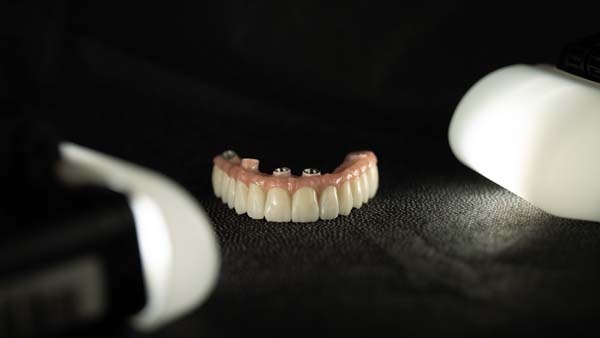How to Care for Your All-on-4 Implants

If you've recently had All-on-4® implants, you may be wondering how to care for them. It’s important to know the best way to keep your implants looking their best so they can last for many years to come. Let’s talk about these implants and the best ways to take care of them.
Understanding the many uses for this implant
All-on-4 dental implants are used when a patient has an incomplete set of teeth on one or both sides or has lost most or all their teeth in a specific area. These implants can hold crowns, bridges, dentures, partials, and complete dentures securely in place. They are made up of titanium screws that connect with metal plates that screw into the jawbone.
It's important to note that dental implants require a healthy jawbone for them to attach properly. Make sure you're in good health before having this procedure done.
Once the implant is placed into your mouth, it takes time for the bone around it to heal. This healing process will take an average of three months but can vary from patient to patient, depending on their age and general oral health. Once healed, your new tooth or teeth are secured onto your new anchor! It's crucial not to disturb these anchors while they're still fresh - avoid chewing anything tough, such as steak, right after getting one put in. Your dentist may tell you how long you should wait until eating those kinds of foods again.
Care of your dental work
This type of implant is usually fitted with a temporary denture or bridge at first. It would help if you brushed your implants like you would any other tooth. Make sure to use plenty of fluoride toothpaste and floss around them. When brushing, hold the head in one hand and the handle in another; this will help prevent hurting yourself or others if you drop it while cleaning. If you're not used to using dental implants yet, take things slow until you get more comfortable with how they work.
There are many benefits to this dental implant procedure. These benefits include having teeth that look natural without unsightly gums, increased support for partial or full bridges/dentures, and being able to eat without having to worry about breaking teeth. These implants are a long-term solution for those who need more than just one tooth replaced!
If you have dental implants, be sure to take care of them by brushing twice daily with fluoride-containing toothpaste and flossing around the anchors at least once per day. Replace your brush every three months if needed.
If there's any part that looks worn down or frayed on your implant, try changing it as soon as possible - this is important because bacteria can grow in these crevices, which can lead to gum disease that may harm the anchor. The implants can be placed in the upper or lower jaw, and they are a great alternative to conventional dentures!
If you have All-on-4 dental implants, do not disturb them until appropriately healed. Once fully healed, your anchor is ready for use when fitted securely into place. Implant anchors will support crowns and bridges as well as partials and total arch replacements if needed.
Request an appointment here: https://www.wayne-dentist.com or call Luke Klele DMD at (973) 553-2512 for an appointment in our Wayne office.
Check out what others are saying about our dental services on Yelp: All-on-4 Dental Implants in Wayne, NJ.
Related Posts
Dental implants are a great option to replace missing or extracted teeth, but unfortunately, not everyone is a viable candidate. One obstacle that can stand in the way of them is a lack of bone support in your upper jaw. This is because your jawbone needs to be sturdy enough to support the titanium involved…
People who have been recommended to get dental implants may be wondering how to take care of them after surgery. Implants are artificial teeth held in place by metal posts positioned in the gums. They are constructed to look and function like natural teeth; thus, managing them is similar to caring for regular teeth. Once…
Root canal therapy can treat and preserve natural teeth affected by deep tooth decay, infection, inflammation, or traumatic injury. The treatment focuses on removing the compromised tissue within the tooth, protecting surrounding teeth, and maintaining long-term oral health. That way, patients can avoid having to go through the trouble of getting tooth replacements that require…
Dental restorative procedures like implant supported dentures can be a solution to partial or complete teeth loss. No one wants to lose a tooth, but you may experience it due to situations beyond control. In addition to transforming your smile, the procedure can boost your self-esteem and have your teeth functioning fully in no time.An…
